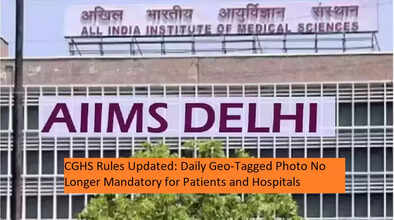CGHS Rules Updated: Daily Geo-Tagged Photo No Longer Mandatory for Patients and Hospitals

New CGHS Guidelines Ease Burden on Patients and Hospitals: Daily Photo Upload No Longer Required
In a significant relief for patients and empanelled hospitals under the Central Government Health Scheme (CGHS), the Ministry of Health and Family Welfare has relaxed the mandatory rule that required daily geo-tagged photo uploads of in-patients during treatment. The move is aimed at simplifying procedures and easing the compliance burden, especially for elderly patients, emergency cases, and referral-based treatments.
This change comes after the government faced numerous challenges with the photo upload rule, which was originally introduced in 2024 to curb fraudulent practices in CGHS claims and reimbursements.
Background: What Was the Previous Rule?
In 2024, the Ministry of Health mandated that hospitals must upload daily geo-tagged photographs of all in-patient department (IPD) cases on the CGHS portal. For out-patient department (OPD) cases, a photo had to be uploaded on the same day of service. The intention was to prevent misuse of benefits and ensure that the treatment was genuinely provided.
However, implementing this rule on a daily basis caused practical difficulties, particularly for senior citizens and hospitals dealing with emergency cases or complex patient inflows.
What Has Changed Now?
According to the new CGHS guidelines issued in 2025, the process for uploading patient photos has been made more flexible and conditional. Here's a breakdown of the new rules based on treatment categories:
✅ 1. IPD – Referral Cases (With Valid e-Referral)
If a patient is admitted through a valid referral that is already uploaded on the National Health Authority (NHA) portal, then no geo-tagged photo is required for that case.
✅ 2. IPD – Non-Referral Cases (Emergency, Age 70+, Follow-up Admissions)
Hospitals are required to upload two geo-tagged photos:
-
One at the time of admission
-
Another at the time of discharge
If the hospital stay exceeds 7 days, then an additional photo must be uploaded on every 7th day. These photos should be taken in the ward or ICU. Importantly, CGHS cards are no longer required to be visible in these images.
✅ 3. OPD – With Referral or Endorsement
Patients using CGHS services under a valid referral or endorsement for consultations, tests, or day-care services do not need to upload any geo-tagged photos.
✅ 4. OPD – Without Referral
Photo uploads are mandatory in limited cases such as:
-
Patients aged 70 years or above
-
Follow-up consultations where no new referral has been issued
-
Bed-ridden patients (unable to walk or move)
In the case of bed-ridden patients, a screenshot of a video consultation is also acceptable.
📸 How to Upload Geo-Tagged Photos?
To ensure smooth compliance, the Health Ministry has outlined specific instructions:
-
Photos must be taken using a smartphone or tablet with location services enabled so that geo-tagging is automatic.
-
Photos must be uploaded to the CGHS portal within 24 hours of being taken.
-
File size of each photo should not exceed 1 MB to avoid network lag.
-
Hospitals must retain a copy of each photo for 90 days for audit purposes.
📝 One-Time Relaxation for Previous Cases
The Ministry has also announced a one-time exemption for all pending cases since December 2024 where photos weren’t uploaded. No penalties will be imposed on such cases. Hospitals simply need to attach a copy of the 2025 office memorandum with the case files and resubmit them on the portal.
Final Thoughts
This reform is expected to streamline the CGHS workflow for lakhs of beneficiaries and hundreds of private and government hospitals. It balances regulatory oversight with operational flexibility, reducing the administrative burden while maintaining accountability.
The changes especially benefit vulnerable groups like elderly citizens, emergency patients, and those undergoing prolonged treatment, making healthcare access under CGHS smoother and more humane.

